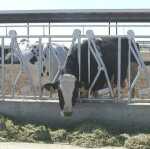County reverses P&Z on Brown dairy

Nearly four months after accepting testimony on an appeal of the Planning and Zoning Commission's approval for a conditional use permit for the Bernie Brown Dairy, the Board of Elmore County Commissioners unanimously voted to overturn the decision.
Elmore County ordinance directs that each proposed conditional use must meet nine standards. But the commissioners found the applicant could only meet three of the nine standards.
All three commissioners agreed the dairy 'would in fact constitute a conditional use as determined by the Official Schedule of District Regulations for the Zoning District involved.'
The commissioners did not feel the proposal 'would be in harmony with and in accordance with the comprehensive plan and this ordinance.' Commissioner Mary Egusquiza noted that while a dairy may be classed as agricultural, she questioned when does it become industrial. Ten thousand head is not agricultural, she said. Commissioner Larry Rose agreed, saying he felt the use is more industrial because of its size.
Each of the commissioners responded they could not find adequate evidence the application 'will be designed, constructed, operated and maintained in such a way as to be harmonious and appropriate in appearance with the existing or intended character of the general vicinity; and that such use will not change the essential character of said area.' Commissioner Connie Cruser said that while the area is zoned as agricultural, the addition of the dairy would change the character and harmony of the area. Rose noted that adding 10,000 head of cattle could not be considered the same as the existing operation. He sees it as more of a factory or industrial operation.
All three agreed the proposal could not meet the standard 'will not be hazardous or disturbing to existing or future neighboring uses.' Cruser and Egusquiza both said they thought the dairy would present a hazard and be disturbing to existing neighboring uses. Rose noted with the base hospital being only 1 ½ miles away from the proposed site, the possibility of fecal dust, odors, etc. created a potential hazard to the large military installation. He felt both the water quality and air quality could be harmed by the dairy operation. Cruser pointed to reports from the EPA and DEQ citing the possible dangers from nitrate levels and pathogens in the manure that could cause disease. The health concerns should be taken seriously, especially with the proximity to the base, she said. "We need to do all we can to keep the base here." She also explained her concerns not only for today, but also noted her worries about the health plan for the future. "We hear about the tax benefits -- the increased tax base that a dairy will give the county," said Rose. "But when we look at other counties with dairies and see that those counties are issuing moratoriums on new dairies, we have to wonder …"
The commissioners questioned the evidence showing the proposal 'will be served adequately by available public facilities and services such as highways, streets, police and fire protection, drainage structures, refuse disposal, water, sewer, or that the person responsible for the establishment of the proposed conditional use shall be able to provide adequately any such services.' Egusquiza pointed out that a traffic study still had not been completed, while Cruser said she could find no evidence that the fire district was prepared to expand to provide protection.
That reasoning continued as the commissioners looked at the next standard 'will not create excessive additional requirements at public cost for public facilities and services and will not be detrimental to the economic welfare of the county.' Cruser said she has concerns with the infrastructure. She sees the proposal as having more of an impact and it being detrimental to the county.
To the question of 'will not involve uses, activities, processes, materials, equipment, and conditions of operation that will be detrimental to any persons, property or the general welfare by reason of excessive production of traffic, noise, smoke, fumes, glare or odors,' the three commissioners felt the dairy operations would be detrimental. Cruser pointed out that while the odor could be annoying, she was more concerned with the health factors caused by what is in the odors.
The commissioners agreed the proposed operation 'will have vehicular approaches to property which shall be so designed as not to create an interference with traffic on surrounding public or private roadways.'
The commissioners agreed the proposed use 'will not result in the destruction, loss or damage of a natural or scenic feature of major importance.'
Cruser pointed out the dairy's own closure plan noted the possibilities of contamination to both soil and water. She said she felt the Board of Commissioners were morally obligated to protect the citizens of Elmore County.
Egusquiza explained that while we all have property rights, it was up to the commissioners to try to protect all the people as well as future generations of Elmore County.
Agreeing the application for a conditional use permit could only meet three of the nine standards the commissioners voted unanimously to overturn the Planning and Zoning decision on the Brown Dairy proposal.
